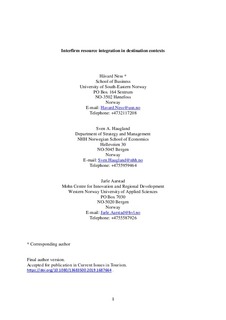Interfirm resource integration in destination contexts
Abstract
In a co-producing tourism destination context, interdependent firms providing the destination product need to coordinate their relationships to achieve resource integration. We focus on two key dimensions of esource integration: (1) interfirm resource complementarity and (2) adaptation of activity structures. Survey data from tourism firms at Norwegian mountain destinations show that both resource complementarity and adaptation of activity structures are a function of trust, authority-based governance, and interfirm learning. Trust and learning have overall stronger effects on resource integration than authority-based governance, in particular on the development of resource complementarity. Authority-based governance has a significant effect on the adaptation of activity structures and a borderline significant effect on resource complementarity.
